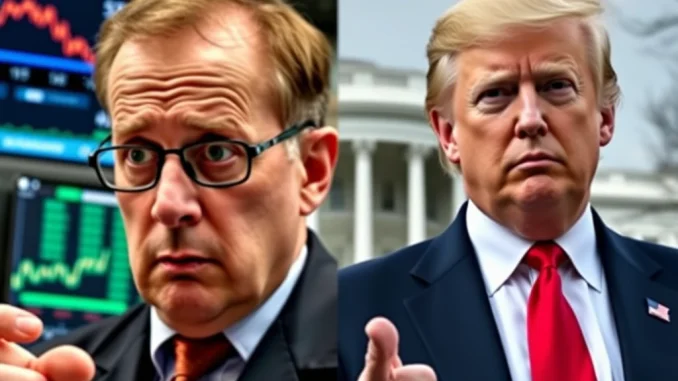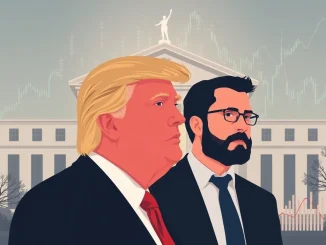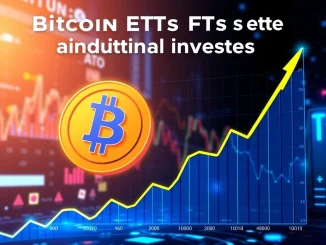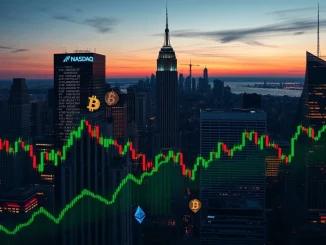
Is the stock market on the brink of a crash? Recent claims made by former President Donald Trump on social media have sent ripples through the financial world, sparking fears of intentional market manipulation. But hold on, before you panic sell your crypto portfolio thinking the traditional markets are going down, let’s dive into the heart of the matter. A top White House official has stepped forward to vehemently deny these allegations. Let’s explore the shocking truth behind these claims and what it means for the stock market and the broader economy.
Is Trump Really Trying to Crash the Stock Market? The White House Responds
The drama unfolded when Donald Trump himself shared a video on his Truth Social platform. In this video, a bold claim was made: President Trump is “purposely CRASHING the market” to pressure the Federal Reserve (Fed) into cutting interest rates. The logic? Lower rates weaken the dollar and bring down mortgage rates – classic economic levers.
This is a serious accusation, especially coming directly from the former president’s social media channels. Such statements can significantly influence investor sentiment and potentially trigger market volatility. But is there any truth to it? According to Kevin Hassett, director of the White House National Economic Council, the answer is a resounding no.
In a recent interview on ABC, Hassett firmly stated that President Trump is not intentionally trying to crash the stock market. He emphasized, “[The president is] trying to deliver for American workers.” This statement aims to reassure investors and the public that the administration’s goals are aligned with economic prosperity, not engineered downturns.
Decoding the Denial: What Did the White House Official Actually Say?
Let’s break down Hassett’s key message:
- Direct Denial: Hassett explicitly refuted the claim that President Trump is intentionally crashing the stock market. This is a direct and unambiguous statement aimed at quelling market anxieties.
- Focus on American Workers: Hassett’s explanation emphasizes the administration’s focus on benefiting American workers. This suggests that any economic policies, even those that might seem unconventional, are ultimately designed to improve the lives of ordinary citizens.
- Reassurance to the Market: By making this statement publicly, the White House is attempting to stabilize market sentiment and prevent any potential panic selling or negative market reactions fueled by Trump’s video.
Why Would Trump Make Such a Claim About the Stock Market?
This is the million-dollar question. Why would a former president, known for often touting the stock market‘s performance during his tenure, suddenly suggest that the current president is deliberately trying to tank it? Here are a few possible interpretations:
- Political Strategy: Accusing the current administration of economic mismanagement is a common political tactic. Blaming the opposition for potential economic woes can be a powerful way to rally support and discredit political rivals.
- Influence on Fed Policy: Trump has been vocal in the past about his desire for lower interest rates. By suggesting the market is being crashed to force rate cuts, he might be attempting to publicly pressure the Fed to ease monetary policy.
- Creating a Narrative: Trump’s statement could be part of a broader narrative aimed at portraying the current economy as weak or unstable under the current administration, regardless of the actual economic indicators.
The Stock Market and Political Rhetoric: A Volatile Mix
The stock market is notoriously sensitive to political news and statements, especially those coming from prominent figures. When a former president makes such a strong claim, it’s bound to grab headlines and influence investor behavior. Here’s why this situation is particularly noteworthy:
| Factor | Impact on Stock Market |
|---|---|
| Presidential Statements | Direct statements from presidents, past or present, carry significant weight and can cause immediate market reactions. |
| Social Media Amplification | Platforms like Truth Social amplify these messages, reaching a wide audience quickly and potentially exacerbating market anxieties. |
| Economic Uncertainty | Existing economic uncertainties, like inflation and interest rate hikes, make the stock market even more vulnerable to political shocks. |
Navigating Market Volatility: Key Takeaways for Investors
In times of political noise and market fluctuations, what should investors do? Here are some actionable insights:
- Stay Informed, But Filter the Noise: Keep track of market news, but be discerning about the sources. Focus on credible financial news outlets and official statements rather than solely relying on social media buzz.
- Long-Term Perspective: Remember that stock market volatility is normal. Maintain a long-term investment strategy and avoid making impulsive decisions based on short-term political headlines.
- Diversification is Key: A diversified portfolio can help mitigate risks during periods of market uncertainty. Don’t put all your eggs in one basket, especially in volatile times.
- Consult a Financial Advisor: If you’re unsure how to navigate market volatility, seek advice from a qualified financial advisor who can provide personalized guidance based on your financial situation and risk tolerance.
The Bigger Picture: Economy, Politics, and the Stock Market’s Future
The interplay between politics and the economy is complex and often unpredictable. Statements like Trump’s, and the subsequent White House denial, highlight this intricate relationship. While it’s crucial to pay attention to such events, it’s equally important to maintain a balanced perspective and avoid knee-jerk reactions. The stock market is influenced by a multitude of factors, and political rhetoric is just one piece of the puzzle.
As investors, staying informed, remaining calm, and focusing on long-term financial goals are the best strategies to weather any market storms, regardless of the political climate. The White House has issued its denial, attempting to calm the waters. Whether this will fully quell market anxieties remains to be seen, but for now, the official message is clear: the economy and the stock market are not being intentionally sabotaged.



